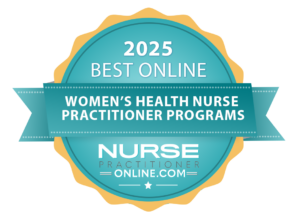Best Online Women’s Health Nurse Practitioner (WHNP) Programs
Compare the 2025 Top Ranked Online WHNP Programs
Women's health is an increasingly important field that requires skilled and knowledgeable healthcare providers. Nurses who wish to specialize in this pathway often opt to complete a Women's Health Nurse Practitioner (WHNP) program - and many of them also opt to enroll in online programs. The right educational route is paramount to success, so finding a great online WHNP program is critical. That's why we have ranked the country's best online Women's Health Nurse Practitioner programs. Browse the top programs below, and check out our methodology to learn more.

Hyden, KY
 Overview:
Overview:Kentucky's Frontier Nursing University offers several online routes to the Women's Health Nurse Practitioner specialty, including an MSN (which integrates into an optional DNP) or a post-graduate certificate. Each program features didactic learning and clinical experience to fully prepare nurses for advanced practice.
- Women's Health Care NP Online
Weston, MA
 Overview:
Overview:Regis College offers highly accredited and renowned women's health nurse practitioner programs through its esteemed nursing department, known as the School of Nursing and Health Sciences. These programs are rooted in the college's philosophy of promoting holistic health and wellness for women through evidence-based practices and compassionate care. Graduates from these programs are equipped with the knowledge and skills to provide comprehensive care for women across the lifespan.
Birmingham, AL
 Overview:
Overview:The University of Alabama at Birmingham offers a highly respected and comprehensive women's health nurse practitioner program through their School of Nursing. The program combines clinical experience with evidence-based research to prepare students for advanced practice in women's health care. The nursing department's philosophy focuses on compassionate and culturally competent care for women of all ages and backgrounds.
What Is an Online Women’s Health Nurse Practitioner Program Like?
For busy nurses who are interested in going through an online women’s health nurse practitioner (WHNP) program, it’s important to choose an accredited, high-quality program that is willing to work with your busy schedule. In order to qualify as an online program, a course of study must require fewer than ten visits to campus per year. When you choose an online women’s health nurse practitioner program, you’ll get to complete your coursework on your own time, allowing you to continue providing patient care at work. Unlike a classroom-based program, you’ll get to interact with other students through online message boards, communicate with professors virtually, and learn on your own time. When you choose an online women’s health nurse practitioner program, your faculty members understand that you’re working hard to provide patient care while also earning your education. They appreciate your need for flexibility, and are often willing to work with you to make accommodations to ensure that you get the education you need.
Choosing an Appropriate Women's Health Nurse Practitioner Program
The first step in choosing a women's health nurse practitioner degree program is to see what your options are based on your current education level. The table below displays degree pathways for the most common starting points.
| If I Currently Have… | Option 1 | Option 2 |
|---|---|---|
| BSN | BSN to MSN Programs | BSN to DNP Programs |
| MSN | Post-Master’s Certificate | MSN to DNP Programs |
To see programs at each degree level, click the buttons below:
Ultimately, your long-term career goals will also be a big factor in deciding which women's health nurse practitioner degree program is the right fit for you. The type of employer you wish to work for, the level and role you wish to hold, and even how much money you hope to earn will all be influenced by the type of degree you choose, and can the right choice can make reaching your professional goals much easier.
If you are still undecided on the women’s health nurse practitioner degree route you should take, our table below will help you narrow down your choices based on your interests.
| MSN | Post-Master's Certificate | DNP | |
|---|---|---|---|
| I enjoy working directly with patients seeking women's healthcare | X | X | X |
| I already hold a graduate degree, but I wish to move into specialized women's health practice | X | X | |
| I feel called to teach at the university level | X | X | |
| I want to advocate for women's health issues and be a leader in my facility | X | X | X |
| I have ideas for clinically relevant research projects to improve women's healthcare | X | ||
| My passion is to create and improve national health policies | X | ||
| I wish to understand population-based women's health issues in order to improve healthcare outcomes across the nation | X | ||
| I want to guide healthcare law and ethics related to women's health | X |
- Online Women’s Health Nurse Practitioner Program Admissions & Requirements by Degree Type
- Online WHNP Program Classes and Curriculum
- Clinical Requirements and Certification
Online Women’s Health NP Program Admissions
As you’re working to further your education, it’s important to consider what type of online WHNP program makes the most sense for you. When choosing the programs you’re going to apply to, you’ll need to consider your prior GPA and education, as well as your future career goals. If you believe you’re well-qualified for a program but fall short of the admissions criteria, you may want to send a letter with your application explaining your reasons for the areas in which you fall short, and how your professional and/or academic experience make up for these areas. Many online women’s health NP programs are willing to make accommodations for nurses in special circumstances. Use the table below to learn more about some of the different admissions requirements for online women’s health NP programs.
| MSN-Level Women’s Health NP | Post-Master’s Certificate Women’s Health NP | DNP-Level Women’s Health NP | |
|---|---|---|---|
| Prior Education/GPA | BSN from an accredited program, GPA of at least 3.0 | MSN from an accredited program, GPA of at least 3.0 | BSN or MSN from an accredited program, GPA of at least 3.0 |
| RN Licensure | Current, unencumbered RN license | Current, unencumbered RN license | Current, unencumbered RN license |
| Professional Experience | At least one year of nursing experience | At least one year of nursing experience | At least a year of nursing experience, preferably in the women’s health |
| Written Requirements | Personal statement and letters of recommendation may be required | Personal statement and letters of recommendation may be required | Resume or CV, admissions essay, personal statement and letters of recommendation may be required |
Online Women’s Health NP Curriculum & Classes
Your women’s health NP curriculum may vary based on your school, and your choice of electives. The time it will take you to complete the program may also vary, depending on whether you choose to go to school full or part-time, and whether you choose a standard or accelerated program. For most MSN programs, it takes about two years of full-time coursework to complete the program. For post-grad certificate programs, it typically takes one to two years to complete the program. DNP programs typically take three to four years. Students who work through a DNP program often have up to seven years to complete their studies. Women's health specialty MSN, post-master’s certificate, and DNP programs differ in both the number of course credits and the number of clinical hours required.
| Degree | MSN | Post-Master’s Certificate | DNP |
|---|---|---|---|
| Average Credit Requirements | 45 | 35 | 65 |
The curriculum for women's health MSN and post-master’s certificates have some overlap, though MSN programs will require more core coursework. At the MSN and DNP level, students will take courses focusing on leadership and policy as well. Those enrolled in the DNP degree program will also take general courses in biostatistics, epidemiology, research, and more. DNP students also complete a capstone course or project which lets them display the knowledge they’ve learned by addressing a clinical problem or question that relates to women’s health. As you go through your women’s health NP curriculum at any degree level, you’ll likely take courses including:
- Pathophysiology of human disease
- Diagnostic reasoning and decision making for the WHNP
- Comprehensive assessment in health care decision making
- Nursing informatics
- The role of the women’s health advanced practice nurse
Women’s Health NP Clinical Requirements
Through clinical courses and internships, students are required to complete between 600-1,000 clinical hours. These hours are essential to the successful completion of clinical courses, as nurses discuss what they learn in real-time health care settings within clinical courses. Most schools are willing to work with students to help them find placements that make sense for them. This could mean being flexible with weekend hours, having more than one placement setting, or doing some work home health care settings. WHNP students may complete clinical requirements in hospitals, birthing centers, women’s clinics, family planning facilities, women’s prisons, and more. They are typically under the supervision of an experienced WHNP, physician/physician’s assistant, certified nurse-midwife, or another seasoned practitioner in the field of women’s health.
